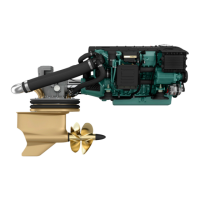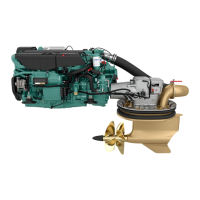Diagnostic function
The diagnostic function monitors and checks that the engine, drive-unit and EVC system function normally.
The diagnostic function has the following tasks:
● Discover and localize malfunctions
● Notify that malfunctions have been discovered
● Give advice in fault finding
● Protect the engine and ensure continued operation when serious malfunctions are discovered.
The diagnostic function affects the engine in the
following ways when:
1. The diagnostic function has discovered a minor
malfunction which does not damage the engine
or drive-unit.
Reaction
: The engine is not affected.
2. The diagnostic function has discovered a serious
malfunction which will not immediately damage
the engine (e.g. high coolant temperature) or
drive-unit.
Reaction: Engine power is reduced till the rel-
evant value is normalized.
3. The diagnostic function has discovered a serious
malfunction which will cause serious damage on
the engine or the drive-unit.
Reaction: Engine power is reduced.
4. The diagnostic function has discovered a serious
malfunction which makes it impossible to control
the engine or the drive-unit.
Reaction: The drive-unit is disengaged and en-
gine power is reduced.
It is possible to do an emergency shift: Please
refer to the “Emergency shifting” section.
5. The diagnostic function has discovered a serious
malfunction on the drive-unit or in the engine fuel
injection system.
Reaction: Engine is stopped
It is possible to do an emergency shift: Please
refer to the ”Emergency shifting” section. In seri-
ous emergency it is also possible to start the en-
gine with gear engaged after acknowledging the
alarm.

